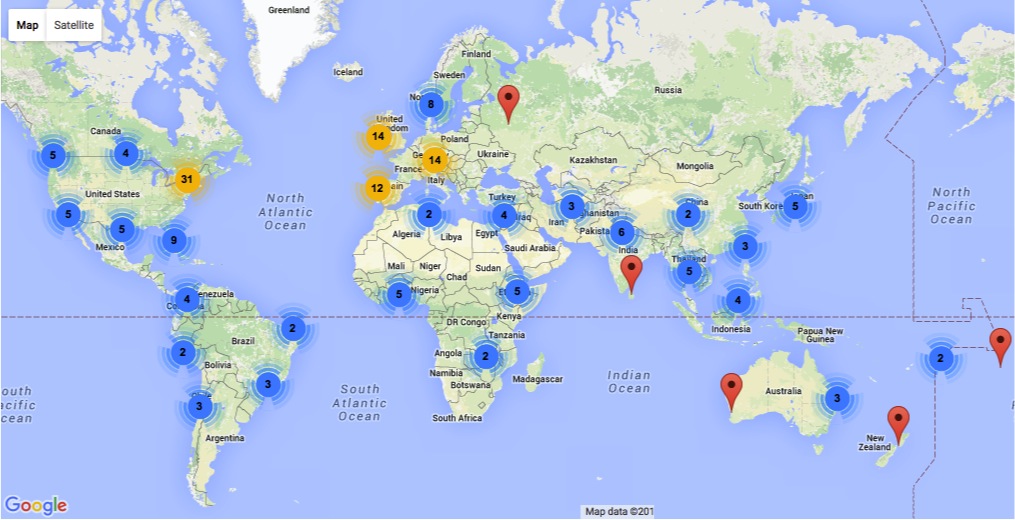Climate1x - Free Online Climate Science Course starts May 3rd
Posted on 27 April 2016 by Sara Harris
This is a guest post by the lecturer presenting edX's Climate1x course. Dr. Sara Harris teaches global climate change, environmental science, and oceanography in the department of Earth, Ocean, and Atmospheric Sciences at the University of British Columbia. She has a PhD in Oceanography from Oregon State University and a research background in paleoceanography and paleoclimate.
If you want to master the basics of climate science join Climate Change: The Science starting May 3rd on edx.org offered by the University of British Columbia.
More than 170 countries just signed the Paris Agreement with the goal to limit global warming to less than 2°C above pre-industrial values, and aim for less than 1.5°C. This course will help you understand what it will take for humanity to reach those goals, by learning how the climate system works.
If you’re a teacher, businessperson, journalist, student, gardener, politician, traveler, or simply an interested citizen, understanding the controls on climate and how human actions contribute to climate change can benefit you in your work and life.
The course is designed to help you be able to:
- Explain climate basics to anyone
- Evaluate scientific evidence about climate change and global warming
- Describe Earth’s possible climate futures, including the role of human choices
- Communicate about climate change issues in your region
Activities are structured for you to practice with climate science concepts, and include:
- Short videos with embedded practice questions
- Interactive simulations and on-line climate models to explore
- Selected reading materials, including from SkS, such as the Debunking handbook and the consensus on the climate consensus paper.
- Community maps with participant-generated essays about climate change from all over the world.
- Seeded and open discussion forums
You’ll have the opportunity to contribute content for other’s learning, by investigating climate change in your own region and posting your findings to course maps (e.g. Figure 1). In past offerings, participants have written about bird migrations in Europe, heat waves in the Middle East, forest fires in Malaysia, sea level rise in Kiribati, and hundreds more topics. This course will give you an excuse and the motivation to find out more about what’s going on near you, plus an opportunity to learn what’s happening in other communities around the planet.
 Figure 1: Locations of contributors to the Climate Change Impacts Map during the most recent offering of Climate Change: The Science. Red pins each represent an essay written by a participant living in that location. Numbers in blue and yellow circles represent the number of essays from that region.
Figure 1: Locations of contributors to the Climate Change Impacts Map during the most recent offering of Climate Change: The Science. Red pins each represent an essay written by a participant living in that location. Numbers in blue and yellow circles represent the number of essays from that region.
So far, the course has a 5-star rating. And it’s free. You can read reviews from past participants here and can sign up here. Your timing can be flexible within a 6-week window starting May 3rd, so if you can’t join the course right away, there’s plenty of time to catch up.
If you want to be better able to interpret the news about climate change, evaluate evidence, and talk to your friends and neighbors about one of the most important issues of our time, this course could be for you. All are welcome.































 Arguments
Arguments






























(snip) offering such a course will do nothing to slow the rise of people who are more informed Ms. Harris. They can easily find so much stuff on the web disputes of everything she could say. No wonder the threat of climate change is low on the priority list of most Americans as well as members of the world body.
[JH] Sloganeering deleted.
Please note that posting comments here at SkS is a privilege, not a right. This privilege can be rescinded if the posting individual treats adherence to the Comments Policy as optional, rather than the mandatory condition of participating in this online forum.
Please take the time to review the policy and ensure future comments are in full compliance with it. Thanks for your understanding and compliance in this matter.
True about the contradictory stuff that may be available, but NOTHING nothing that can withstand even the briefest scrutiny.
[JH] No all-caps.
I noticed that #1, fletch92131 had referred to Dr. Harris by eliminating the 'Dr.' and addressing her as Ms. Pretty well didn't need to read the rest of the comment.
I expect numerous people will find the information posted by Dr. Harris informative but that will not lead to effective remedial measures being carried out. The existing global infrastructure is having the deleterious impact of climate disruption and ocean acidification as well as pollution. The best that society can possibly do is adopt measures to assist in the powering down as the natural resources inevtibaly run out.